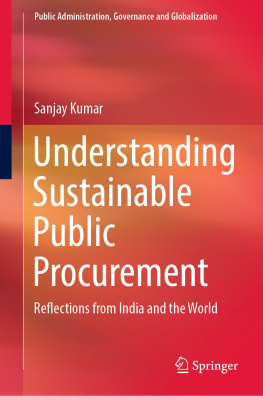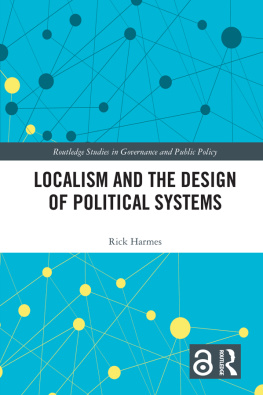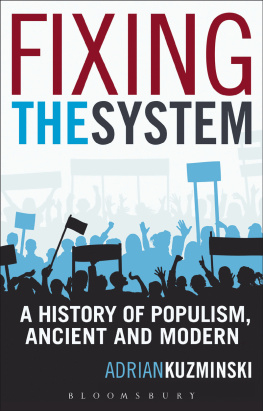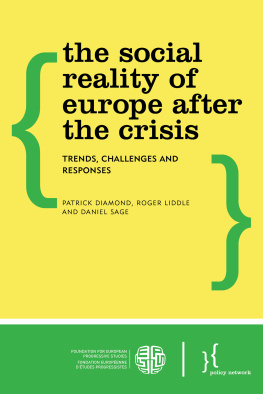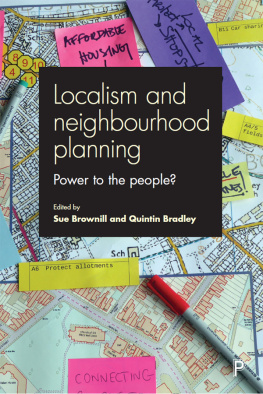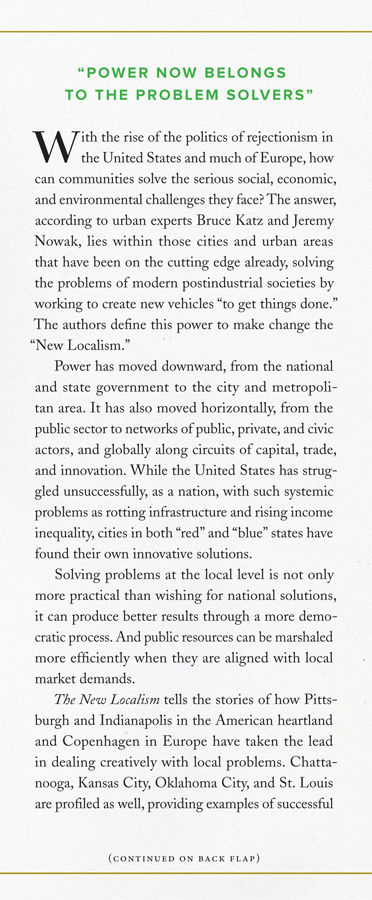
THE NEW LOCALISM
HOW CITIES CAN THRIVE IN THE AGE OF POPULISM
BRUCE KATZ and JEREMY NOWAK
BROOKINGS INSTITUTION PRESS
Washington, D.C.
Copyright 2017
THE BROOKINGS INSTITUTION
1775 Massachusetts Avenue, N.W., Washington, D.C. 20036
www.brookings.edu
All rights reserved. No part of this publication may be reproduced or transmitted in any form or by any means without permission in writing from the Brookings Institution Press.
The Brookings Institution is a private nonprofit organization devoted to research, education, and publication on important issues of domestic and foreign policy. Its principal purpose is to bring the highest quality independent research and analysis to bear on current and emerging policy problems. Interpretations or conclusions in Brookings publications should be understood to be solely those of the authors.
Library of Congress Cataloging-in-Publication data are available.
ISBN 978-0-8157-3164-1 (cloth : alk. paper)
ISBN 978-0-8157-3165-8 (ebook)
9 8 7 6 5 4 3 2 1
Typeset in Electra
Composition by Westchester Publishing Services
Contents
Preface
This book evolved over many years of observation, engagement, and analysis. But the political events of 201617, from Brexit to the election of Donald Trump, from the United States pulling out of the Paris climate agreement to new populist movements in Europe and elsewhere, brought clarity and urgency to our central focus on the importance of local activity and prompted us to write the book now.
The two of us have spent our professional lives working to enhance the prosperity of cities and metropolitan areas and expand the opportunities of people who live there. We bring complementary but distinct experiences in urban practice and policy. One of us (Jeremy) has worked at the local level, primarily in Philadelphia, creating one of the largest community investment institutions in the nation, and then went on to chair the board of the Federal Reserve Bank of Philadelphia, as well as advise philanthropies, universities, and investment companies on urban development strategy. The other (Bruce) has focused on urban innovation, infrastructure, and inclusion at the national level, holding senior staff positions in the U.S. Senate and the U.S. Department of Housing and Urban Development and then starting a think tank on urban and metropolitan communities at the Brookings Institution.
Our different vantage points have given us a healthy respect for the power of national and state governments. We have also come to understand that the most forward-thinking initiatives in the nation, including those that deal with pressing social, economic, and environmental concerns, are emerging from local communities far more than from national policies or platforms. Why? The reasons are myriad and are based in deep structural changes in the economy and society more than in ephemeral political cycles.
Despite many positive expressions of change across the nation, American political discourse is largely (and understandably) focused on the dysfunctions of Washington, D.C., and many statehouses. Much less airtime goes to hard-working problem solvers in American cities and local communities. Discord plays better than collaboration; defining problems will always get more coverage than delivering solutions. Populism has cachet even when it supports a largely incoherent political agenda or loses most elections. Solutions, particularly those that involve deep institutional change, can be downright boring.
Yet a quiet but profound movement is under way in hundreds of cities, towns, and rural communities to meet the future head on. The time has come for those initiatives to take center stage. That is the purpose of this book. The movement that we call New Localism is analyzed in these pages, situated in its historical context, and framed in a future based on its successes and challenges. These stories are not reducible to political sound bites, nor are they the product of overnight success. But local activity is changing America in positive ways. And these actions draw from global innovations and have enormous implications for cities around the world.
Many see the times in which we live as concerning, even chaotic. We view this book as an act of optimism. Positive energy and affirmative possibility flow from the places and people we profile: vibrant, innovative, pragmatic, and relentlessly future leaning and progress seeking.
Acknowledgments
This book, like the work of cities, has been a collaborative effort.
We owe an enormous debt to the stellar research team of (or affiliated with) the Brookings Centennial Scholar Initiative. Julie Wagner urged us to write the book in the first place, believing that our views on New Localism as a counterforce to the rise of angry populism deserved a large audience. Her research with Jennifer Vey, Scott Andes, and Jason Hachadorian on the growing nexus between place making and innovation has been highly influential.
Luise Norings distinctive views on the shifting nature and critical importance of urban governance and finance, breakthrough research on Copenhagens public asset corporation model, and emerging methodology of urban problem solving have fundamentally transformed our thinking.
Alex Jones not only managed the process, but also provided daily guidance and innovative insights on all things urban, large and small.
We also benefitted from the research and practice contributions of Ross Tilchin, Brianne Eby, Alaina Harkness, Caroline Conroy, Jessica Brandt, Angela Blanchard, and Andy Altman and the work of three terrific interns at BrookingsZhiyin Pan, Henry Eisner, and Adam Vieira.
The staffs of the Centennial Scholar Initiative at Brookings and the Brookings Institution Press were invaluable in the planning of the book, its release, and the campaign to spread New Localism throughout the United States and the world. Ellen Ochs and Marikka Green have alone and together mastered the art of stewarding networks of people and places. Their efforts have been amplified by the work of Grace Palmer, Shervan Sebastian, Charlotte Baldwin, Bill Finan, Yelba Quinn, Carrie Engel, Janet Walker, Valentina Kalk, Kristen BelleIsle, and Zoe Covello.
The Centennial Scholar Initiative itself would not have been possible without the remarkable leadership of Strobe Talbott, Kim Churches, and Martin Indyk. These individuals recognized the need for city-led, interdisciplinary problem solving in the world and gave us the space to invent outside the traditional structures of the institution. To that end, Kemal Dervi and Bruce Jones helped us explore new linkages among cities, foreign policy, and global governance.
The fine work of the Metropolitan Policy Program and the Reinvestment Fundour former institutional homescontinues to inform and motivate.
Special thanks to the team at TSD CommunicationsDavid Dreyer, Ricki Seidman, and Eric Londonwho read early versions of the manuscript and kept our writing focused on the readers rather than the authors.
After months of writing, our peer reviewersEugenie Birch, Ira Goldstein, and Bob Weissbourdprovided the perfect mix of encouragement and criticism to keep us going, in the process adding their diverse expertise to this book. We also want to thank those who read and responded to specific portions of the manuscript at various times, including Bob Keith, Sean Closkey, Scott Jenkins, Michelle Kreisler-Rubenstein, and Mark Pinsky.
Susan Kellam provided a final structural review of the manuscript that sharpened our writing and brought the key points of New Localism to the surface. Marjorie Pannell, Kimberly Giambattisto, and the team at Westchester Publishing Services made sure we dotted our is and crossed our ts with their final copyedit.
Next page



![Katz - Zombie Slayer Box Set, Vol. 1 [Books 1-3]](/uploads/posts/book/141697/thumbs/katz-zombie-slayer-box-set-vol-1-books-1-3.jpg)



